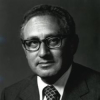Henry A. Kissinger

Henry A. Kissinger
Henry Alfred Kissingeris an American diplomat and political scientist. He served as National Security Advisor and later concurrently as United States Secretary of State in the administrations of presidents Richard Nixon and Gerald Ford. For his actions negotiating the ceasefire in Vietnam, Kissinger received the 1973 Nobel Peace Prize under controversial circumstances, with two members of the committee resigning in protest. Kissinger later sought, unsuccessfully, to return the prize. After his term, his advice has been sought by world leaders...
NationalityGerman
ProfessionStatesman
Date of Birth27 May 1923
CountryGermany
The American formal position has been that we oppose violence by governments against their people. That principle should not be abandoned.
I do not criticize people who take a public stand on human rights issues. I express my respect for them. But some people are more influential without a public confrontation.
I don't think we should pay people to fight terrorism. I would be amazed if they asked for anything in return.
Even paranoid people have enemies.
There are only two reasons to sit in the back row of an airplane: Either you have diarrhea, or you're anxious to meet people who do.
People are generally amazed that I would take an interest in any form that would require me to stop talking for three hours.
Our problem was that in the American approach to Soviet affairs policy has oscillated between people who take an essentially psychological approach and people who take an essentially theological approach, and the two really meet. The psychologists try to "understand" the Soviet Union. And try to ease its alleged fears. The theologians say the Soviets are evil.
People think responsibility is hard to bear. It's not. I think that sometimes it is the absence of responsibility that is harder to bear. You have a great feeling of impotence.
I have always expressed respect for those people who make public declarations.
It is barely conceivable that there are people who like war.
Whenever a new president comes in, people that are used to the previous president wonder if he has the same capacity.
Becoming conscious is of course a sacrilege against nature; it is as though you had robbed the unconscious of something. The nice thing about being a celebrity is that if you bore people they think it's their fault.
What we in America call terrorists are really groups of people that reject the international system
A leader who confines his role to his people's experience dooms himself to stagnation; a leader who outstrips his people's experience runs the risk of not being understood.